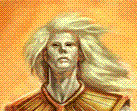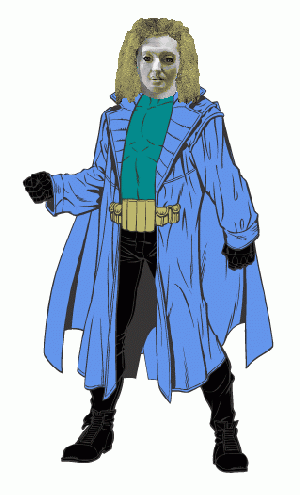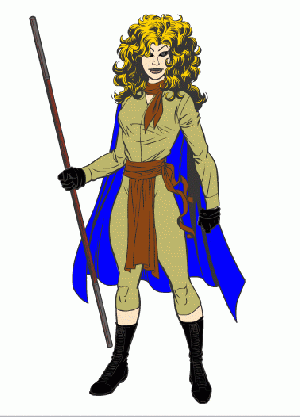Pythron: Difference between revisions
Eyas Wtine (talk | contribs) |
Eyas Wtine (talk | contribs) |
||
| Line 127: | Line 127: | ||
==Anthem of the Pythrons== | ==Anthem of the Pythrons== | ||
[http://www.youtube.com/watch?v= | [http://www.youtube.com/watch?v=rNcAcvuUD-g Anthem Instrumental] <br> | ||
<br> | <br> | ||
Out of Terror and Fear<br> | Out of Terror and Fear<br> | ||
Revision as of 11:00, 5 July 2013
| Intelligent Lifeform Index |
|---|
| Pythron | |
|---|---|

| |
| Four Letter Code | PYTH |
| Federation Status | Allies of Federation |
| Planet of Origin | Pythro V |
| Encountered | DS9: Rivals |
| T/E Rating | T0/E0 |
| Current Tech Level | N |
| List of Named Pythrons | |

| |
Full ILI Gallery • Permitted Species Gallery | |
Name
- Proper Name: Pythron
- Pronunciation: Pyy-Fron
Home System
- Quadrant: Beta
- Location: Rin'Go Sector (coordinates B27-0004-1309)
- Proper Name: Pythro Stellar System
- Pronunciation: Pyy-Fro
- Star: It orbits a class (Yellow) star
- Distance from Star: it's orbit is approximately 568 million km
- Companions: There are 9 planets in this system. Theirs is the 5th.
Home World
- Proper Name: Pythro V
- Pronunciation: Pyy-Fro 5
- Diameter: 13,478 km (8,375 miles)
- Gravity: 1.04 standard gravity with a density of 5.4
- Axial Tilt: 16.8%, with normal terran seasonal changes
- Orbital Period: 418 days
- Rotational Period: 28 hours
- Classification: M
- Surface Water: 49%
- Atmosphere: 1.03% is a standard pressure with 74% nitrogen, 26% oxygen, 2% trace chemicals
- Climate: Fairly diverse climates with few extremes
- Population: Just over 3 billion
History
Pythro V has been populated for thousands of millennia although recorded history is very recent by comparison. The dominant sentient life forms call themselves Pythrons, a derivation of the word ‘Py-Tor’ meaning ‘The People’ in their ancient Astian tongue. Many Pythrons get a little exasperated explaining to Federation visitors that it has nothing to do with the Terran word ‘python’ – a type of limbless reptile on Earth. The Pythrons were formed from the many nations located across the planet’s surface, all of similar heritage, except for the Vignian tribe whose ancestry split from the main Astian family in the deep past. The Pythrons were assumed to have evolved from a primitive dog-like creature over the course of a few million years, becoming the humanoid bipeds of today. However, no ‘link’ species can be found in the fossil record and there is much scientific discourse about their species’ true bloodlines.
Pythron recorded history begins about 1000 years before the present day, where they first started mastering agriculture. Technological progress was rapid and a modern post-industrial society came about in less than 800 years. After centuries of tribal and national battles for supremacy, a leader emerged from the largest Astian tribe who managed to defeat all raiders to his lands, and established planetary peace for the first time. This leader was Conzaneyas Thrax and he is still regarded as the Father of the Nation. It was at this time that the wars of religion came to an end, and the pursuit of scientific advancement became a unifying focus.
Pythron civilization eventually advanced to space travel, and soon came to the attention of alien races – both friend and foe. Different star empires made overtures for an alliance with mineral-rich Pythro V. After considering the different threats and bribes, the Pythron leaders accepted an associate status as part of the Federation. However, their initial confidence was severely shaken after an unknown alien force assaulted Pythro V in a major invasion, known as the Dark Times. No Federation forces were nearby to help the Pythrons, and although the indigenous Pythron Armed Forces managed to defeat the invasion before Federation forces arrived in any number, the devastation in life and property was immense. The most important victory was achieved by Pythron troops defending the capital Bantok. Ever since that time, Pythrons have not believed that the Federation can be fully relied upon. To this end, the Pythron Armed Forces are maintained to a high degree and form a major constituent part of Pythron society.
Government
Since the unification of the Pythron nations under Astian dominance, the planet has been ruled by the Inner Council, who are nominated from and elected by the Global Senate. The Global Senate is in turn elected by universal adult suffrage. The Inner Council forms the Executive and the Global Senate the Legislature. The Council nominates one of their members to be President for a four cycle term. The Council also controls the military, the judiciary and the state administration. The vast state bureaucracy filters down to the local level where it liaises with clans and communes to form regional government. Two curious departures from this ostensibly democratic hierarchy are:
1) The very first President of Pythro V, Conzaneyas Thrax, was cryogenically frozen at the point of death and remains nominal head of state, higher even than the President of the Inner Council.
Thrax has not moved or shown any vital signs since his incarceration, but a cultist sect has built up around his memory – the “Golden Sanctum”. They hold powerful sway in Pythronic politics and form a significant minority in the Global Senate and Inner Council. In political terms, they are seen as hawkish. Their main opposition are the ruling, Federation-friendly “Pythronian League”.
2) The Vignian Pythrons never fully accepted Astian overlordship, and are allowed a semi-independent existence upon Pythro V. They joined forces with the Astian Pythrons during the devastating alien invasion of three decades earlier, but have since returned to splendid isolation of meditation and contemplation.
Description
Pythrons are humanoid bipeds with many similar features to Terrans, although are on average taller and broader. Adult females are usually over 6 feet tall, whilst adult males are on average between 6’4” and 7 feet tall. They are pale skinned, have long wavy blond hair and their eye colour is invariably black – making their iris and pupil appear as one.
Physiology
Although often muscular, Pythrons are not out of proportion and indeed have a silhouette similar to that of a tall Klingon. Their voices are not particularly deep, and are regarded as being surprisingly softly spoken for their size.
Pythrons live, on average, between 80 and 100 Terran years, but some have reached 150 years. The only main difference in the aging process between Pythrons and Terrans is an extended middle age. A Pythron will remain physiologically more or less the same from ages 45 to 80, but then begin to age more rapidly over the coming decade. Only Vignian Pythrons have been known to live over 130 years.
The sub-tribe of the Vignians also differ from the Astian majority in lacking any head hair, and being more slender in profile. They are, however, equally resilient.
Psychology
Astian Pythrons have no known psychic or empathetic abilities, but consider themselves to be good strategists and have a developed awareness of other races actions and body-language. This can often help them be good confidence tricksters and hustlers, although this is by no means a race-wide past time and this sometimes leads the overconfident to be tricked themselves. Vignian Pythrons on the other hand are considered to have some latent psychic powers, but are very secretive about it.
Religion
Pythrons are mostly agnostic or atheist. Any earlier religious beliefs have largely been eradicated by the wand of science, and most superstitions are maintained only by the older members of population or in more rural communities. Different nations on Pythro V often had conflicting religions in the past, sometimes going to war over doctrine or custom. Gradually the Thraxian thesis of scientific advancement and space exploration became the overriding strategic goal of the population, and came to predominate.
Mythology
Pythron religion and mythology were always closely linked, although both have now become peripheral to everyday life. The main myth of Pythron pre-history is of the Winged Spirit falling from the sky and battling the Fire Demon of the Mountains. The Winged Spirit was victorious and defeated the Demon, but was mortally wounded in the fight. Its feathers floated to the ground and from these the tribes of Pythro V sprung. This legend is no longer taken literally, and some Pythronic historians have postulated that the winged spirit may have been a spaceship, and the feathers were escape pods but nothing has ever been satisfactorily concluded. This legend certainly predates any indigenous space travel.
Society
Pythron society is very close-knit and family based. Families often consist of up to ten children, partly encouraged in recent decades to try and repopulate the planet after nearly 30% of the population were killed during the attempted alien invasion of the Dark Times. It is often thought that any family not producing over at least 6 children is not trying hard enough. This often puts greater pressure on the children of small families to over-achieve to compensate for non-existent siblings. Families live in extended communes, and often share property and the rearing of children between grandparents, cousins, uncles and aunts. Pythrons are fiercely loyal to their family, clan and planet. Although often reluctant to get involved in off-world problems, they will not hesitate to die to protect those close to them.
Culture
Pythrons have a stylish culture and architecture, and strive to show their aesthetic side. This has often been interpreted by non-Pythrons as a way to dispel the prejudice that Pythrons are large and brutish, and only good as physical tasks like mining and fighting. It is, however, well known that Pythrons are not great singers or dancers.
Customs
As with their defunct religions, many Pythronic customs have been abandoned. The one exception to this rule is a deep regard for traditions of the military. Seen as the ultimate guarantor of Pythronic freedom, the members of the military are highly respected and the awarding of their ceremonial armour to young cadets when they graduate, usually in their late teens, is a major event in Pythronic life.
Technology
Pythronic civilization is technologically advanced compared to many neighbouring systems, but moved forward exponentially after contact and trade with the Federation began. Now capable of building their own warp star ships, the nascent Pythron Fleet is a growing force in the region, but is strictly limited to exploration, trade and defensive roles. On Pythro V itself, the population has largely avoided the construction of vast densely populated cities, and over 80% of the population live in widely scattered communes. Even the capital city of the whole planet, Bantok, is only first among equals of these communes.
Economy
The Pythron economy is largely based upon trade of raw materials, of which Pythro V, its moons and neighbouring planets are rich. The influx of foreign currency into the Pythron Treasury has allowed them to purchase technology and luxuries from other systems. Pythrons are not natural shopkeepers, and prefer to deal in wholesale bulk buying and selling. They are no match for the Ferengis when it comes to striking a deal on-the-spot. Their vast raw material deposits has made Pythro V a tempting target for raiders, pirates and even full-scale alien invasions.
Military
The Pythron Armed Forces are among the best equipped, best trained and toughest troops found in the galaxy. Their soldiers’ natural physical strength, ability to withstand pain and bravery is coupled with the best technology that money can buy. Employment in the military is seen as one of the highest accolades any young Pythron can aspire to. Despite this, Pythro V has managed to remain a democratic state without an over mighty military. It has more of the feel of a peace-loving nation at war, rather than a totalitarian militaristic state at peace. There are, however, many in upper echelons of the Armed Forces who are deeply skeptical about the politicians’ flirtation with closer ties with the Federation. Military service is voluntary, but often oversubscribed.
In 2388, the Pythron High Command sent an expeditionary force called the 'Army of Execution' to aid their allies the Bardeezans in their on-going struggle with the neighbouring planet of Byzatium.
Pythro-Byzallian War
The pretext for the war had its origins in border disputes between the Byzallian Government and their neighbours the Bardeezans in the Vectis System. For years the Byzallians had been taking many Bardeezans as ‘Hotch’ (slave) labour. In time, the hard pressed Bardeezans turned to their powerful allies the Pythrons for support.
The Pythrons sent an Army of Observation to Bardeez to bolster the planets defences. An ultimatum was also sent to Byzatium, hoping to give them one final warning to stop ravaging the Bardeez population. When the Byzallian Government professed no knowledge of their slave trade, the Pythrons were unimpressed.
In 2388, the Pythron President J’Eyga ordered his Army of Observation to go on the offensive, and become an Army of Execution and invade Byzatium itself under the command of Marshal Karinus LeNoir.
LeNoir (pictured left), assisted by Grand Admiral Tagora, initially planned a five-pronged invasion of Byzatium, composed of over one million troops in five task forces and designed to encircle the Byzallian cities, and their one field army and force it to fight his overwhelming might. In the event, LeNoir settled on three invading forces with the main command, now consisting of several hundred thousand Pythrons and Bardeezans under his direct command. He moved his forces from their unopposed landing zones south of the most powerful Byzallian state: Roscland. He set up a tactical head quarters at Sunbury. The three task forces were to invade across the Byzallian continent - their objective being Pride City - the Roscland capital.
While Byzallian army numbered perhaps 350,000 men, it was essentially a militia force which could be called out in time of national danger. As more and more Byzallians were killed or captured, they were increasingly having to rely upon their ‘Hotch’ slaves or on those considered too young, too old or too ill for normal military service to plug the gaps in their ranks. As the war progressed, an eclectic mix of species are drafted to fight. Orders can sometimes need to be given in over twenty languages.
The initial entry of all three task forces was largely unopposed; such was the incredilation and internal squabbling of the various Byzallian city-states. The main Pythron army under LeNoir advanced from Sunbury, and then encamped near Vadum Sanctum. That day LeNoir decided to split his forces and moved out to support a reconnoitering party, leaving the camp in charge of Praetorian Vaingore Hoff. Meanwhile, the Byzallians had finally brought together their main force under the Byzallian military leader – Thazdiuz Telent. The Pythrons were then outmanoeuvred by the main Byzallian army nearly 200,000 strong led by Telent. LeNoir was lured eastward with much of his task force by a Byzallian diversionary force while the main army attacked his base at Vadum Sanctum. The Pythrons at Vadum Sanctum were overwhelmed, the base annihilated with heavy casualties as well as the loss of all its supplies, ammunition and transport. The defeat left LeNoir no choice but to hastily retreat back to his main base at Sunbury. In the battle's aftermath, some 40,000 Byzallian reserves mounted an unauthorised raid on Sunbury but were driven off after ten hours of ferocious fighting. While the Pythron main force under LeNoir's command severely damaged, the other two Pythro-Bardeezan forces remained with their transports to await events..
LeNoir ordered the Bardeezan under their commander Gobowen Fair to attack the Byzallian stronghold in Holdbane. Gobowen personally led the attack on Holdbane. However, the main Byzallian army approached to help their besieged colleagues in Holdbane, the Bardeezan force began a retreat which turned into a rout and were pursued by the Byzallian gunships, inflicting heavy casualties on the Bardeezan force.
The next day 200,000 Byzallian troops with armoured support attacked Gobowen's remaining Bardeezan troops in a well-fortified bastion at Chetz Sea. The ragged Bardeezans held them off, and after five hours of heavy attacks the Byzallians withdrew. While Gobowen and his Bardeezans were thus engaged, LeNoir’s main force had been resupplied from Pythro, and was was storming its way from Sunbury back towards Vadum Sanctum to retake the ground it had lost and so clear their path to Pride City!
The new start of the larger, heavily reinforced second invasion was not promising for the Pythro-Bardeezan Alliance. Despite their success at Chetz Sea, they were right back where they had started from. The de facto Byzallian leader – Telent, knowing that the newly reinforced Pythrons would be a formidable opponent, attempted to negotiate a peace treaty. LeNoir was not open to negotiations, as he wished to restore his reputation in the eyes of his Masters on Pythro. He thus proceeded towards Pride City, intending to defeat the main Byzallian army. Telent was forced to bring his army back to his capital, and the biggest battle of the war began. Casualties, both military and civilian, were heavy. Perhaps a million souls perished in the bloodbath. In the end, the sheer might of the giant Pythron warriors carried the day. Telent’s Byzallian forces were defeated decisively.
After the battle of Pride City, the remnants of the Byzallian army dispersed, most of the leading officers tendered their submission, and Telent (pictured right) became a fugitive. LeNoir set about reducing Pride City to rubble, and searching for the last Byzallian leader.
Pulling the strings behind the scenes was the megalomanic Mons Vor – a powerful Byzallian engineer and technocrat who had wooed the Pythron High Command to attack his own homeworld. It never once seemed that Mons Vor would show any restraint as his own people were being obliterated. The Warped Mind of this Master Engineer had only one objective, the capturing of the Byzallian tribe – the Omunics and their genetic technologies. Once he had both the organic and in-organic dark arts under his control, the whole galaxy would quake! What the short-term tactical considerations of his Pythron underlings were, he cared not.
Anthem of the Pythrons
Anthem Instrumental
Out of Terror and Fear
War And Division
Rose Our Father
Saviour of the Nation!
Thrax help us in our battles
Thrax send love, Thrax send war
The cruelest atrocities
Pythro's blood is borne of these
For glory, for honour
Victory is upon us
Thrax our true saviour
Send armies to defend us
Cities built, then cities burned
Children’s innocence all spurned
The victors over hurt and fear
Will rule for the next thousand years
For glory, for honour
Victory is upon us
Thrax our true saviour
Send armies to defend us
Federation Intelligence Files
While there have been a number of this species that have served the Federation and Starfleet, LtCmdr. Eyas Wulfantine of the USS Mercury is one of the few in current times that have stood out.
Notes
THIS PROFILE WAS RE-WRITTEN BY THE SDC; Species Development Committee
- If in the coarse of a mission or shore leave new information not included in this report is discovered or developed then a copy of said data must be forwarded to the SDC as per Federation and Starfleet internal directives.




